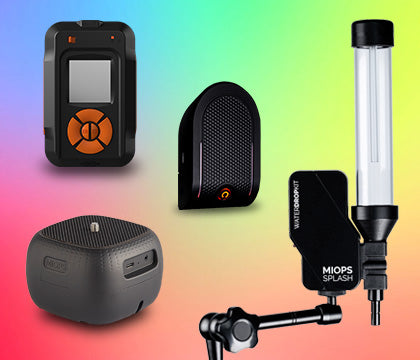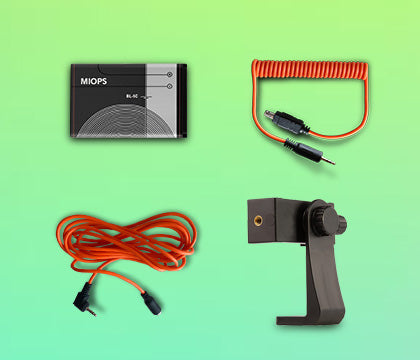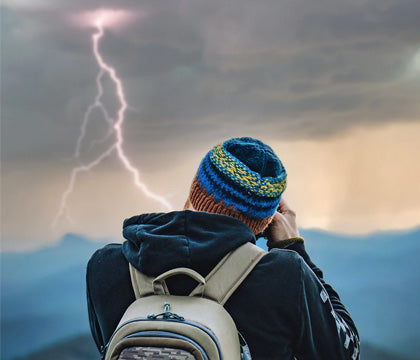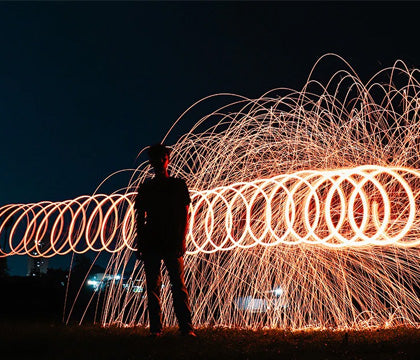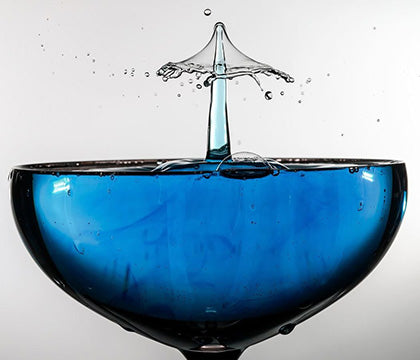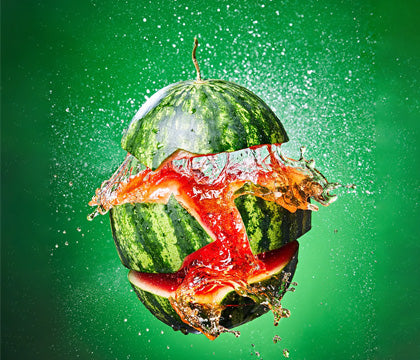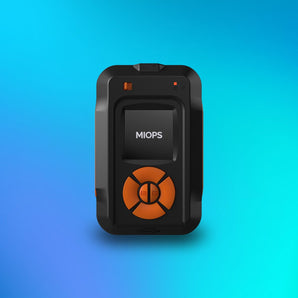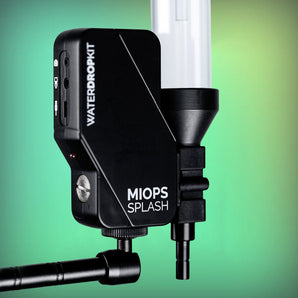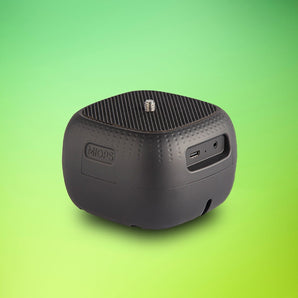The world of photography has a lot of thrilling things to offer. There are different photography types that you can focus on and be really good at. While you don’t need to acquire a highly expensive camera if you’re still starting, there’s one tool that will definitely up your game in whatever type of shooting you want to take on: a remote camera trigger.
What is a remote camera trigger?
Simply put, a camera trigger, (MIOPS Smart+ will be a good option for you.) is a device that allows you to control your gear from a distance, either through a wired or wireless connection. Most camera triggers in the market today can offer so much more than letting you click the shutter button from a distance.
So what can a remote camera trigger do?
How will it help you get started and up your game in the different photography types? To answer this question, let’s take a look at the different forms of photography and the role of a remote camera trigger for each type.
Lightning Photography

Lightning photography is probably one of the most challenging types of photography out there for different reasons. For starters, you have to capture a millisecond burst of light in the sky. Secondly, lightning strikes can be unpredictable, in terms of timing and the location of its burst. Most importantly, capturing lightning during a thunderstorm is dangerous, especially that most professional photographers do it at night, in remote sites free from light pollution.
How does a remote camera trigger help you capture lightning?

Typically, shooting lightning bursts requires two things: luck and patience. However, a camera trigger will help you bypass those things and let this awesome device do the trick.
A lightning camera trigger is built with a highly sensitive light sensor in detecting lightning bursts. Smart camera triggers, for instance, MIOPS, has a dedicated Lightning Mode.
- Under this setting are adjustable options for timing, level of light sensitivity, shooting delay, and more.
- Smart camera triggers allow you to save the same settings for similar future sessions.
- You can use your lightning camera trigger to detect lightning activities. Monitor and predict lightning activities in your area using a compact and portable device that fits in your pocket.
- Photographing lightning activities can be risky. Unfortunately, the best lightning photos are those of the most violent bursts. Luckily, with a remote trigger, you can set up your camera near the lightning events while ensuring your safety.
Breaking Glass Photography

Have you ever seen a photo of shattering glass, with the shards captured in mid-air, frozen in time? Broken glass images can be one of the coolest types of photography, but most beginners don’t think about the mess and the risks that come with it. For breaking glass photographers, safety should always be a priority.
How can a remote camera trigger help you shoot shattering glass?
The two most important factors for successful breaking glass photography are fast lighting and fast shutter release. While you can ask your friends to help you with the setup, there’s just so much that human reflexes can do. Breaking glass happens in a split second and relying on how fast you release the shutter and the regular light burst of your flash may not be enough. A remote camera trigger can make a big difference.
- A camera trigger provides a faster release mechanism than the human reflexes can achieve. That’s why this is a must-have device in high-speed photography.
- Remote triggers don’t only trigger your camera. It can also be connected to an external flash unit to burst it at the perfect moment of the event. Imagine having the power to control these two units at once. Imagine the images that you can capture with all this control and freedom.
- Advanced camera triggers have a specialized Sound Mode that can detect loud events. This is advantageous especially in a dark studio setup where light from flash units plays a big role.
- Smart camera triggers allow you to set the timing, not just for your camera shutter but also for your external flash unit.
Waterdrop Photography

There is a reason why water drop photography is one of the most popular types of high-speed photography. Something is mesmerizing about a single drop of water and how it bounces and creates smooth ripples. Think of water sculptures frozen in time and imagine how, even with your beginner camera kit, you can capture this high-level event.
What can a remote camera trigger offer in your first steps to water drop photography?
Water is a very unpredictable medium and any attempt to control it can be futile. This is one of the challenges of water drop photography or any type of capturing images that involve this element. However, with a remote camera trigger, you don’t have to worry about finding the right timing to release your shutter. Even beginner DSLRs can capture water drop events without worrying about missed opportunities. How? Two things: timing and precision.
- High-speed camera triggers not only detect light or sound. The best ones in the market like the MIOPS camera trigger have a built-in Laser Mode that detects movement at the exact moment of contact.
- A high-speed camera trigger can be used by pointing the laser in the direction of the event. Once the droplet breaks the laser, it will signal your camera to release the shutter.
- A remote camera trigger is also capable of controlling the light burst of your external flash unit for that more defined shot.
- Aside from capturing the image at the exact moment that the droplet breaks the laser, you can also set the timing in millisecond delays. Remote triggers can also do multiple shots of the events so you won’t miss the best shots that the event can offer.
Rocket Launch Photography

Rocket launch photography is the ultimate type of photography for those shutterbugs who also love anything about the cosmos. Shooting a rocket and capturing a moment in history sounds awesome, and even beginner photographers can up their game in this challenging shoot. The question is, are you willing to only rely on a camera and a tripod to capture this rare event?
Why do professionals heavily rely on camera triggers for rocket launch photography?
Most of the time, rocket launches are set in controlled and highly secured locations. Aside from securing a pass and making sure you have everything in your camera bag ready, you only have one take at it.
You are only given just a few moments for that perfect rocket launch photo before this modern wonder takes off. More importantly, schedule delays caused by technical issues and weather changes can pose a challenge to properly setting up your camera and getting it ready for the event. Here’s why a remote camera trigger should be in your bag at all times.
- While photographers can set up their equipment near the launch site, they are not allowed within the site during the actual event. This is where a remote trigger is a must-have.
- Camera triggers can connect to your shutter wirelessly. MIOPS camera trigger can also be connected to a smartphone device. Through a dedicated app, you can easily adjust the trigger’s setting, timing, and trigger release delays.
- You don’t have to manually trigger your camera to shoot during the actual event. Just use your remote trigger’s Sound Mode, an ideal setting for this extremely loud event.
- The smart thing about a good camera trigger’s dedicated Sound Mode sensor is its sound sensitivity. Users can easily adjust the Sensitivity Setting to only detect a particular sound event.
- As mentioned earlier, delays in launch schedules are common. This means that it can happen at any time of the day, where there are more or fewer light sources that might affect the quality of your images. Good camera triggers allow you to make last-minute adjustments, not just on the sound sensitivity and delay timer, but also the exposure value.
High Dynamic Range (HDR) Photography

The range of HDR photos in terms of details and luminosity makes them some of the most stunning images out there. Successfully capturing an HDR shot will depend on the factors of quality and precision. While your camera takes care of the quality of the photo that you take, a different device can ensure precision for that perfect HDR.
Why is a remote camera trigger important in HDR photography?
Most people think that remote camera triggers are only useful in high-speed events like bullet photography, lightning photography, or water splash photography. A remote camera trigger has more to offer than just speed. It provides accuracy and produces precise images because of its highly intuitive technology.
- Typically, digital SLRs are already capable of capturing HDR photos through a dedicated HDR mode. However, a camera trigger breaks the limits of what your camera can do, especially if you only have mid-range camera gear.
- With a remote camera trigger, you can set up your camera in the most optimal area where you can get the best images while you wait.
- A remote camera trigger will allow your camera to target a more specific center exposure on the frame. This will allow you to choose and highlight the most important section of the composition.
- Using a smart camera trigger, you can automatically adjust the Step Down/Step UP numbers during the actual event of the shot without disrupting your camera’s capture sequence.
Timelapse Photography

It’s always magical to witness the passing of time through a timelapse video of picturesque landscapes. This photography technique works by capturing frames at specific intervals. Unlike the normal pace of taking a video, timelapse frames are much more spread out. Once played in sequence at normal speed, it appears that time is moving faster.
How can a camera trigger advance timelapse photography?
The most common timelapse captures are of sunsets, beach scenes, and moonrises, among others. Photographers interested in flora and fauna images also use this mode to speed up slow processes, such as the growth of a plant, the transformation of a bud to a fully-blooming flower, a butterfly coming out of its cocoon, to name a few. So where does a camera trigger belong in this type of photography?
- Through a camera trigger’s dedicated mobile application, you can capture events at the right timing and exposure without having to manually adjust your camera’s setting.
- A camera trigger will help you time your sequences to the most specific millisecond interval that you want to achieve. Smart camera triggers give the option to pre-set the number of frames that you can capture per second.
- When shooting in the great outdoors, a remote camera trigger will help you capture rare timelapse shots without disturbing the wildlife that you are observing. This will help you shoot unique images and timelapse sequences of sites in their most natural setting.
Other High-speed Photography Types
There is a long list of high-speed photography types that continue to amaze and awe the photography community. All these creative thinkers believe that the potential of their camera device knows no limit.
From bullet photography, broken bulb photography, balloon popping photography, water splash photography, and other major high-speed events, just having the right device to defy speed and capture seemingly impossible shots can make a huge difference.
How can a remote trigger for your camera enhance high-speed photography?
Timing, accuracy, and stability: these qualities are important in producing a high-quality high-speed photography image. As the earlier sections have established, camera triggers play a huge role in capturing elusive and fast images that cannot be observed by the naked eye.
Camera triggers and the features and modes that come with them can make all these possible, especially in capturing other high-speed photography types.
- A camera trigger’s Sound Mode can be used to capture balloon popping, bulb breaking, and other events that produce loud sounds.
- Through the Lightning Mode, your remote trigger can also help you capture stormlapse sequences for a more exciting timelapse variety.
- A remote trigger’s laser mode can be used in detecting motions at specified locations. Having the ability to signal your camera through motion is an advantage in skateboard photography, wildlife photography, water splash, and water sculpture photography, as well as bullet photography.
- Smart camera triggers allow you to use multiple modes simultaneously. This will help you bring the power of light, laser, and sound sensors to capture the most unique and once-in-a-lifetime events out there.
Entering the world of photography has a lot of surprises to offer, especially if you’re using the right gear to get the most out of your devices.
Take impossible photos by turning your camera into a high-speed capture device!
MIOPS SMART+
Don’t limit your creativity. Start breaking the boundaries of speed, light, and sound by grabbing your first remote camera trigger kit. If you’re looking for a good smart camera trigger, make sure that it has the features that you need for that type of photography that you want to explore. Have fun!
Related Article: 7 Photography Techniques To Use MIOPS Smart+
Blog Credit: Charm Villalon
Charm is a writer and a visual artist. Her drive to share ideas and stories is evident in her background in communication arts and language studies. Years of professional experience in content creation have given her a broad proficiency with the process of engaging online communities. An appreciation for multiple languages and cultures drives her to seek out experiences and capture these moments through her writing, digital art, and photography.
Image Credit: Unsplash, Fstoppers, Blender Nation


